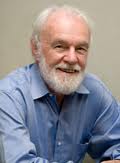David Harvey
From Geography
Contents |
Biography
David Harvey (31 October 1935) is an influential social geographer and is distinguished professor at the City University in New York (www.davidharvey.org). Harvey is a key figure in the modern Marxism. In 2007 Harvey was listed as the 18th most cited intellectual of all times in humanity and social science. Harvey is particularly interested how culture, state, arts and law were inextricably bound with the circulation of capital (Aitken & Valentine. 2006. p.69).
Harvey and Marxism
Harvey wants to prove that Marxism is not dead, which seemed to be the case after the fall of the Iron Curtain and Marxists lost their strength (Aitken & Valentine. 2006. p.189). Harvey argues that there are two fundamental aspects which represent the Marxist ideology: time and space. In capitalism every chain of capital has to go as fast as possible which can result that the chain of capital or production is going faster than any human being can handle. Besides time is capital also taking space. Fundamental features in the landscape are confiscated by capitalism. Large factories or giant offices are build and thereby denigrating nature. Capitalism is taking place everywhere. Furthermore, Harvey argues that capitalists are taking labor in their hands, when a capitalist can make his product with cheaper labor elsewhere the capitalist will easily move his factory. Thereby not having any empathy for the laborers who loose their jobs because of these movements.
According to Harvey the works of Karl Marx are more relevant than ever (Harvey, 2010). In Harvey's review of the Great Recession, the financial crisis which occurred in the late 2000s, Harvey argues that these shortcomings of the capital system were already predicted by Marxists. Harvey in this context identifies himself with the Occupy Movement of New York: The Party of Wall Street has one universal principle of rule: that there shall be no serious challenge to the absolute power of money to rule absolutely. And that power is to be exercised with one objective. Those possessed of money power shall not only be privileged to accumulate wealth endlessly at will, but they shall have the right to inherit the earth, taking either direct or indirect dominion not only of the land and all the resources and productive capacities that reside therein, but also assume absolute command, directly or indirectly, over the labor and creative potentialities of all those others it needs. The rest of humanity shall be deemed disposable (Harvey, 2011) It was Marx who already said that the shortcomings of the capitalist system would be dramatically exposed one day. And if that would happen the proletariat would stand up and demonstrate to fight the capitalist system.
Example
As stated above, Harvey thinks Marxism is more relevant than ever before. An example of this could be the fact that a few years ago, and still ongoing, a big financial crises occured. Marx already had predicted this. This example is geographically interesting because of the fact that the national economies of countries are very connected nowadays. That is also the reason why a huge crises can occur; when something goes terribly wrong in an important (economic) country, it will most likely continue to spread over the world.
References
- Aitken, S & Valentine, G. (2006). Approaches to Human Geography. London: Sage.
- Harvey, D. (2010). A Companion to Marx' capital. New York: Verto Books.
- Harvey, D. (2011). Curriculum Vitae David Harvey. Visited on 31 October 2011 at www.davidharvey.org.
- Harvey, D. (2011). The Party of Wall Street Meets its Nemesis. visited on 31 October 2011 at www.socialistworker.org.
Contributors
- Page created by Peter de Boer. October 2011.
- Page edited by Koen Molenaar 26-10-2012
- Page enhanced with an example by Kasper van de Langenberg 31/12/12
